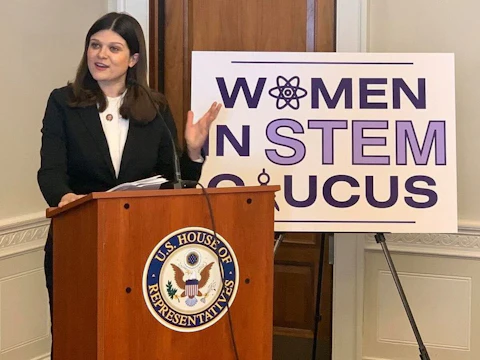Allison Alexander sees a lot of kids at work, and despite being vaccinated against COVID, she masks to keep them safe. And she thinks other Michiganders should too.
OAK PARK, Mich.—As a nurse and lactation consultant, Allison Alexander is no stranger to masks and vaccines.
For healthcare workers, she told The ‘Gander, both are frequently required. And, in her line of work especially, entering families’ homes and potentially exposing infants, she’s especially cautious. But despite how stressful and unusual the last year and a half has been, Alexander says the combination of masks and vaccines is something she’s used to. She’s required to get vaccines for a range of things all the time as a nurse, including the seasonal flu.
“If you interact with the public, it is still your responsibility,” Alexander explained. “Even though I’m fully vaccinated, the babies I work with are not. And if I’m going from one home to another, if I were to come down with something and not have symptoms I could very easily spread it to another family.”
If a Michigander lives alone in the woods, she said, masking probably isn’t needed there. But vaccinated people can still be carriers, and the more people someone interacts with, the more chances to catch and spread COVID they have.
And it isn’t just the infants she works with that Alexander is interested in protecting. Vaccines are still not available to children under 12, and the Delta variant has been particularly troubling toward children. According to the American Academy of Pediatrics, the last week of August and the first week of September were the worst and second-worst weeks respectively in terms of child coronavirus hospitalization to that point.
UP NEXT: How Local Vaccine Rates Shape Michigan’s Economic Future
Though children make up 22% of the population nationally, they made up 29% of the COVID hospitalizations in the beginning of September. There are signs that the disease itself is becoming more dangerous to kids once they’ve caught it, as well. In Texas, for instance, experts report seeing a rise in respiratory distress among infants and small kids.
Having children herself and working with children regularly, this is something that gives Alexander reason to mask when it isn’t explicitly required.
“The little ones had to do a lot to protect the vulnerable adults early on, and it’s only fair that we’re doing the same now until they can be vaccinated too,” she said. “We owe it to them, we have to keep it up for a little bit longer still.”
She also masks to protect people who are immunocompromised or, for another reason, are at high risk. But just because she still masks doesn’t mean she’s not seen vast changes in her life since getting the vaccine.
Alexander told The ‘Gander that vaccination of both herself and other Michiganders has significantly improved her life, and possibly the lives of her neighbors, in an interesting way. Given her husband’s high-risk status and her young children at home, and given her understanding of how disease spreads at a healthcare worker, she’d developed some serious mitigation measures she no longer needed after vaccination.
“I burst into tears when I got my vaccine,” she said. “Just going to work every day, I was masking, I was changing clothes before I entered the house. My neighbors saw way more than they needed to, ‘cause I’m just, you know, stripping on the porch, but I was just terrified.”
That wasn’t an overreaction to the pandemic for her, though.
RELATED: The Pandemic Isolated Them, Now the Vaccine Is Bringing These Michiganders Back Together
Alexander was swabbing kids for COVID and seeing plenty of tests come back positive in the early days of the pandemic, so she knew she had definitely been exposed more than once. She had to go above and beyond to avoid the risk of spreading the disease. Now, with the virus better understood and vaccines available to her, her husband, and her 12-year-old, she’s content to just mask and vax.
And she encourages other ‘Ganders to mask and vax as well.
“This is not the first time we’ve been called upon to do hard things,” said Alexander. “We’ve had food rations and victory gardens and presidents saying ‘you better start raising chickens in the yard because you’re not getting eggs,’ you know. This is not the first time. There have been drafts. There have been many times in history where society has been called upon to do hard things and we’ve done it. And we’ve gotten through the hard times.”





